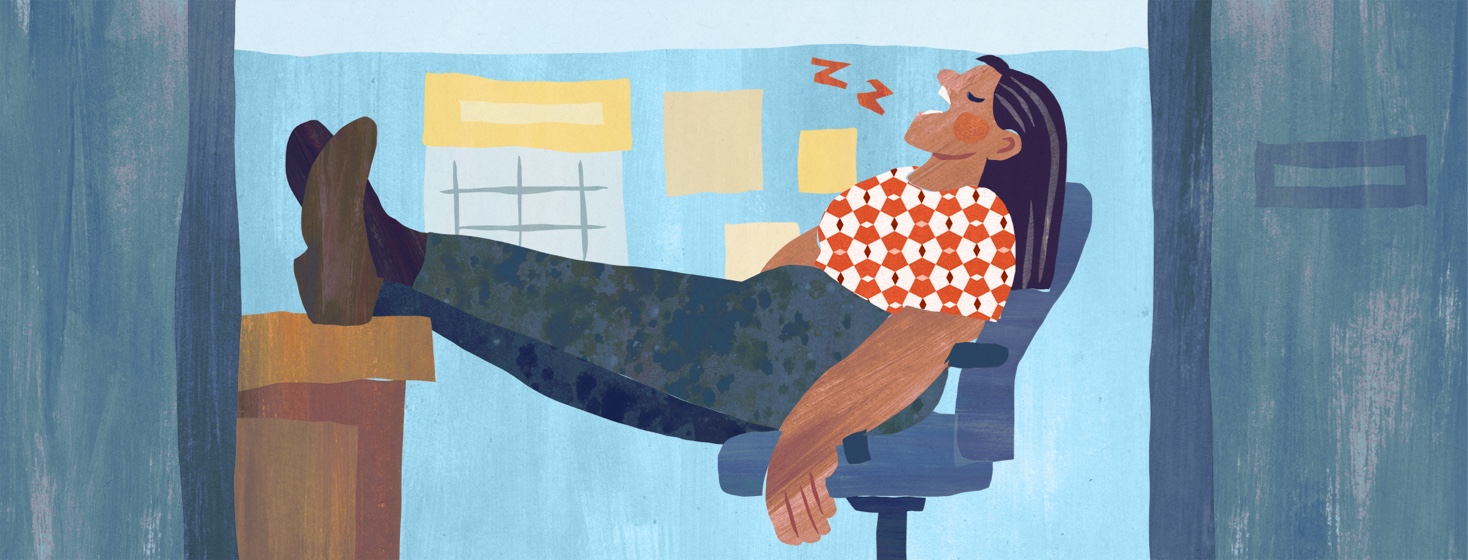What Is Menstrual-Related Hypersomnia?
I rarely take naps. But I get very sleepy the few days before my period. And it’s not just regular endo fatigue. It’s "fall asleep in the middle of the day" tired. That's called excessive daytime sleepiness (EDS). I also snooze for ten or more hours at night instead of my usual eight. And there's usually a bit of a fight to wake up.
I told my regular doctor about this. She gave me antidepressants to treat premenstrual dysphoric disorder (PMDD). The meds helped my mood but did nothing for my sleepiness. So I mentioned my symptoms to a sleep medicine specialist — someone I interviewed for a different story on sleep disorders. While she couldn't give me a diagnosis, she said it sounded like I have menstrual-related hypersomnia (MRH).
That's the first I'd heard of this term. Here's a deeper look into what it means.
Fatigue vs. sleepiness
First, let me make a distinction between fatigue-tired and sleepy-tired. You can have both at the same time, but fatigue is a general lack of energy. It’s that kind of bone-tired where you’re awake, but everything takes more effort. You might be physically or mentally worn out, but you don't necessarily sleep more.
Hypersomnia, by definition, means you spend lots of time asleep. In the days leading up to my period, I'll go to rest my eyes in the afternoon, only to conk out and start dreaming. These are sometimes called "irresistible naps."
And that morning wake-up struggle? That's due to something called sleep inertia — the groggy stage between sleep and wakefulness. It often lingers in people with certain sleep disorders, such as idiopathic hypersomnia.1,2
So what is MRH?
It’s considered a kind of recurrent sleep disorder. According to the literature, it causes increased somnolence — the medical term for sleepiness — before your period starts. There isn't a consensus on how long before; I couldn't find much research on the condition, even though it was described back in the 1940s.3-5
Experts aren't exactly sure why MRH happens, and I'm not going to speculate here. It's usually called rare, but the doctor I talked to said it’s pretty common. My guess is, like a lot of female hormone-based conditions, it’s just underdiagnosed.
Is it related to endometriosis?
I couldn’t find any research connecting MRH to endo. But studies show that people with endo often have sleep trouble, including poor quality rest, EDS, and insomnia. Though, excessive sleepiness from hypersomnia is different than the kind caused by a lack of good sleep.6
Endometriosis is also an inflammatory condition. And there’s plenty of evidence to show that constant low-grade inflammation makes people more fatigued and sleepy.7
How MRH affects me
I don't get symptoms every month. But if I do, MRH will hit the few days before my period starts. It'll go away once the bleeding begins. My sleepiness is usually worse if I have an increase in other inflammatory symptoms, such as joint pain.
The following symptoms may also happen around the same time:
- Brain fog
- Restlessness
- Clumsiness
- Memory trouble
- Irritability
- Anxiety and depression
How I manage MRH
When I had a 9-to-5 job, I’d drink coffee in the afternoon to stay awake. I don’t think that's a good long-term plan; caffeine in the afternoon makes it hard for me to fall asleep at night. But I didn't have another option at the time.
Now that I'm self-employed, here's what I do:
- Exercise. Physical activity, such as going for a run, boosts my energy.
- Limit caffeine and alcohol. I avoid coffee after 11 a.m., and I don't drink alcohol at all. Caffeine and booze both interfere with proper sleep.
- Prioritize rest. I normally go to bed at 10 p.m. and get up at 6 a.m. But when hypersomnia hits, I go to bed earlier and sleep in when I need to.
- Nap. I take 20-minute or hour-long naps in the afternoon when I can't stay awake. This usually happens once or twice a month. It's much easier to do this now that I work for myself. But I would probably bring up the habit with future bosses.
Thankfully, my overall fatigue and sleepiness is better (but not gone) since my excision surgery. My doctor removed an endometriosis lesion and some scar tissue. It's possible I have less inflammation now, which might help me feel less tired. But I can't know for sure.
Is there treatment for MRH?
There's evidence that hormonal birth control may help.4 But I can't handle the side effects of hormonal treatments, so that's not something I've tried. Stimulants are another choice, and one I haven't tested. These drugs are used to promote wakefulness for people with other sleep disorders, such as idiopathic hypersomnia and narcolepsy.2,4
Tell your doctor or a sleep specialist if you think you have MRH, especially if it gets in the way of your daily life. Medication or lifestyle changes may help. And if you find a treatment that works, let us know!

Join the conversation